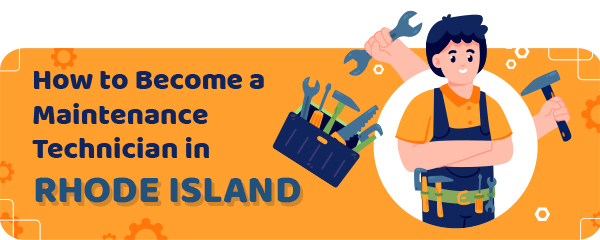Maintenance techs keep buildings and production lines alive in Rhode Island.
If you like fixing things and don’t mind learning about electrical, mechanical, and HVAC, this path fits.
You can start with a high school diploma, add the right training, and earn specific trade licenses as your work gets more specialized.
Rhode Island has a steady demand for maintenance technicians in industries like healthcare, housing, manufacturing, and public facilities.
Article Table of Contents
- 1 Steps to Become a Maintenance Technician in Rhode Island
- 2 Licensing Requirements to Become a Maintenance Technician in Rhode Island
- 3 Maintenance Technician Programs in Rhode Island
- 4 Salary
- 5 Frequently Asked Questions
- 5.1 Do I need a state license if I only do basic building maintenance in Rhode Island?
- 5.2 Do maintenance technicians in Rhode Island need their own tools?
- 5.3 What physical demands should you expect in a maintenance technician role?
- 5.4 Are union jobs common for maintenance technicians in Rhode Island?
- 5.5 What industries in Rhode Island hire the most maintenance technicians?
Steps to Become a Maintenance Technician in Rhode Island
- Finish high school or earn a GED. Most entry roles ask for it. Use shop, automotive, or electronics classes to build hands-on skills.
- Enroll in community colleges or technical schools. Since being a maintenance technician in Rhode Island can cover a lot of ground, look for programs that match your interests and skill sets.
- Understand OSHA safety requirements. A solid grasp of OSHA safety standards is critical in maintenance work, not just for compliance but for your protection. This includes knowing lockout/tagout procedures, hazard communication rules, proper use of personal protective equipment, and how to prevent slips, trips, and falls.
- Get proof of OSHA training. Many Rhode Island employers require an OSHA 10 or OSHA 30 card before you can work independently, and those credentials can make you more competitive when applying for jobs. Get your EPA 608 card if you will handle refrigerants.
- Apprenticeships are available in Rhode Island through the RI Department of Labor and Training. Look for skilled trades that maintenance roles often cover, like electricians or elevator constructors. State-registered apprenticeships combine on-the-job training with classroom instruction.
- Apply widely and tailor your resume. Highlight troubleshooting wins, preventive maintenance routes, CMMS use, and any PLC or VFD work. Rhode Island employers span hospitals, apartments, hotels, universities, manufacturers, and municipalities. Also, review job postings every few months to see if the requirements change. That’s the best way to see what your application should include.
- Look for chances to broaden your experience in specialized areas like HVAC or electrical. Even if your current role covers general maintenance, take opportunities to assist on projects involving heating and cooling systems, electrical work, or other skilled trades. Shadowing licensed technicians, volunteering for cross-training, or taking short courses in these areas can make you more valuable to employers and open the door to higher-paying, specialized positions.
Licensing Requirements to Become a Maintenance Technician in Rhode Island
Rhode Island licenses the trades that maintenance techs often perform, rather than a single “maintenance technician” credential.
The Division of Workforce Regulation and Safety’s Professional Regulation unit oversees boards for electricians, hoisting engineers, the Mechanical Board, plumbers, and telecom systems contractors and technicians.
If your day-to-day includes work governed by these boards, you must hold the correct license class and follow renewal rules.
For refrigeration, pipefitting, sheet metal, and fire protection sprinkler fitting, Rhode Island sets specific classes for journeypersons and masters.
Progression usually requires documented hours or completion of an approved apprenticeship before you can test.
The state’s codified rules list each license class, such as Refrigeration Journeyperson Class I and II, and Refrigeration Masters I and II, along with prerequisites.
Hoisting engineers who operate certain equipment also need a state license.
Applications require identity documentation, a fee, and, in some cases, medical certification.
Renewals are typically due every 24 months.
Contractors doing basic HVAC contracting may need to register with the Contractors’ Registration and Licensing Board, while individual HVAC mechanics and refrigeration techs must be licensed through DLT’s Professional Regulation.
Maintenance Technician Programs in Rhode Island
While there aren’t a lot of colleges or programs in Rhode Island that cover just learning the skills of a maintenance technician, we’ve rounded up a few options.
We recommend looking into apprenticeships throughout the state if you’d like to earn a paycheck while still learning.
Community College of Rhode Island
CCRI offers hands-on programs in advanced manufacturing and related technologies that map well to maintenance roles.
You can pursue certificates or an associate degree in areas that cover CAD/CAM, machining, and equipment operation, which strengthen mechanical and troubleshooting skills.
Tuition and fees vary by residency and load.
Current fee schedules are posted by CCRI each term.
CCRI also offers a Maintenance Technician 18-month track.
This program is part of the ed2go virtual curriculum.
Other colleges statewide and nationwide offer the same program for the same price of $1,695.
Lincoln Tech
Lincoln Tech’s Lincoln (Greater Providence region), RI campus offers training that can help future maintenance technicians build core skills.
Programs in HVAC and electrical/electronics provide hands-on experience with systems you’ll likely encounter on the job, from wiring and circuits to heating and cooling equipment.
You can also pursue welding here.
Flexible class schedules, industry-standard tools, and career services support make it a practical choice for those starting or advancing in building and equipment maintenance.
For more about tuition pricing, you’ll need to go through the Net Price Calculator, as the final number depends on various circumstances.
| School Name | Address |
|---|---|
| Community College of Rhode Island | 400 East Ave, Warwick, RI 02886, United States |
| Lincoln Tech | 622 George Washington Hwy, Lincoln, RI 02865, USA |
Salary
We look at online sources to give us information about the annual salary of a maintenance technician in Rhode Island.
The median pay is $62,700.
The pay range goes from $51,600 to $76,000.
The Bureau of Labor Statistics job outlook shows that the maintenance technician industry is expected to grow by 5% between now and 2023. That’s about average for all careers.
Annual Salary Range:| Location | Avg. Annual Salary |
|---|---|
| Providence | $58,192 |
| Warwick | $56,021 |
| Cranston | $58,565 |
| Pawtucket | $47,416 |
| East Providence | $68,046 |
| Woonsocket | $53,003 |
| Newport | $52,811 |
| Cumberland | $58,868 |
| Lincoln | $55,863 |
| West Warwick | $81,073 |
Regional Salary in Rhode Island
| Region | Employed | Avg. Annual Salary | Avg. Hourly Pay | Top 10% Annual Salary | Bottom 10% Annual Salary |
|---|---|---|---|---|---|
| Providence-Warwick, RI-MA | 6,780 | $53,990 | $25.96 | $76,520 | $36,860 |
* Employment conditions in your area may vary.
Frequently Asked Questions
Do I need a state license if I only do basic building maintenance in Rhode Island?
If your tasks are general facility upkeep without regulated electrical, plumbing, refrigeration, hoisting, or telecom work, you may not need a DLT trade license.
The moment your duties include covered trade tasks, the proper Rhode Island license is required.
Do maintenance technicians in Rhode Island need their own tools?
Often, yes.
Many employers expect technicians to have basic hand tools like screwdrivers, wrenches, and pliers.
Larger or specialized equipment is usually provided on-site.
Job postings will often list required personal tools.
What physical demands should you expect in a maintenance technician role?
Expect to lift heavy objects, work in tight or awkward spaces, climb ladders, and be on your feet for long periods.
Jobs may also require working in hot, cold, or noisy environments, depending on the facility.
Every job posting is required by law to list the physical demands and essential functions of each job.
Are union jobs common for maintenance technicians in Rhode Island?
They exist, particularly in public sector roles and certain trades like electrical or HVAC.
Union jobs may offer higher pay, stronger benefits, and job security.
When doing an apprenticeship, ask your mentors for guidance and information on this
What industries in Rhode Island hire the most maintenance technicians?
Manufacturing, healthcare, education, hospitality, and property management are major employers.
Facilities like hospitals, universities, hotels, and manufacturing plants rely heavily on skilled maintenance staff.
One of the best parts about being a maintenance technician is that they are needed across all industries and communities.
Read the full guide: How to Become a Maintenance Technician


